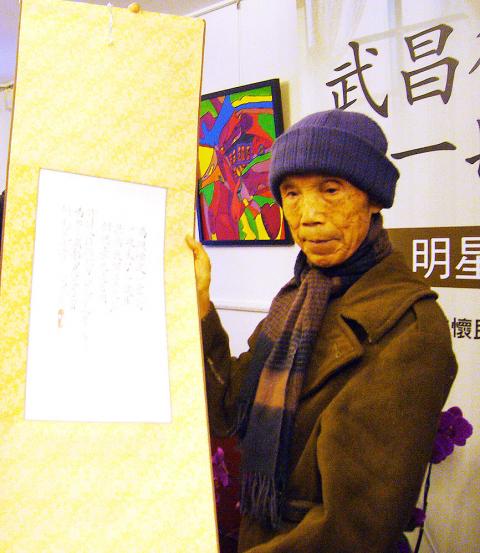Renowned poet Chou Meng-tieh (周夢蝶) died in New Taipei City on Thursday at the age of 92 from complications associated with pneumonia.
Along with his poetry, Chou was known for his monk-like habits, which he adopted after immersing himself in Buddhism later in life.
Born in China’s Henan Province in December, 1921, Chou’s original name was Chou Chi-shu (周起述).

Photo: CNA
During the Chinese Civil War, he joined the Chinese Nationalist Party (KMT) youth corps and came to Taiwan in 1948 after the KMT lost the Chinese civil war.
He was separated from his family, including his grandparents, mother, wife and children, who all remained in China.
However, after five decades apart, Chou revisited his hometown.
At 32, Chou began to write poetry, which was published in the literary pages of Central Daily News and Young Soldier Daily (the forerunner of Youth Daily News).
In the 1950s, Chou became a member of the Blue Star Poetry Society (藍星詩社), an influential gathering of mostly Chinese poets and writers.
In 1959, Chou began selling poetry and literature in front of Cafe Astoria on Wuchang Street (武昌街) in central Taipei, which was a favorite hangout of intellectuals at the time.
That year, he published a collection of poems, entitled Gudu Guo (孤獨國, Lonely Land), which is his most well-known work.
Later in life, Chou delved into Buddhism and took up Zen meditation.
A picture of Chou sitting on a street corner, quietly meditating, became one of the symbolic images of an era, showing a literary man’s solitude against the backdrop of Taipei’s hustle and bustle.
Inspired by Confucian tradition and philosophy, Chou did not pursue material gains and lived a simple life, alone, throughout his adult life.
As a poet, Chou picked up the nom de plume of “Meng-tieh” (夢蝶), which means the “dream butterfly.”
He said it was inspired by Taoist master philosopher Chuang-Tze’s (莊子) famous tale about a butterfly dream.
The name is reflects his yearning for freedom, as well as his frugal, restrained way of living.
Highly regarded in Taiwan’s cultural circles, Chou was named the first literature laureate of the National Culture and Arts Foundation in 1997.
Hung Chung-hao (洪崇豪), spokesperson for the Buddhist Tzu Chi General Hospital in New Taipei City’s Xinzhuang District (新莊) where Chou was treated, said that Chou did not have any relatives in Taiwan.
Instead, many of his student followers are helping to arrange the funeral in accordance with Buddhist traditions.
On the news of Chou’s death, the Ministry of Culture released a statement and requested that the Presidential Office issue posthumous honors for Chou.

Chinese Nationalist Party (KMT) Chairman Eric Chu (朱立倫), spokeswoman Yang Chih-yu (楊智伃) and Legislator Hsieh Lung-chieh (謝龍介) would be summoned by police for questioning for leading an illegal assembly on Thursday evening last week, Minister of the Interior Liu Shyh-fang (劉世芳) said today. The three KMT officials led an assembly outside the Taipei City Prosecutors’ Office, a restricted area where public assembly is not allowed, protesting the questioning of several KMT staff and searches of KMT headquarters and offices in a recall petition forgery case. Chu, Yang and Hsieh are all suspected of contravening the Assembly and Parade Act (集會遊行法) by holding

PRAISE: Japanese visitor Takashi Kubota said the Taiwanese temple architecture images showcased in the AI Art Gallery were the most impressive displays he saw Taiwan does not have an official pavilion at the World Expo in Osaka, Japan, because of its diplomatic predicament, but the government-backed Tech World pavilion is drawing interest with its unique recreations of works by Taiwanese artists. The pavilion features an artificial intelligence (AI)-based art gallery showcasing works of famous Taiwanese artists from the Japanese colonial period using innovative technologies. Among its main simulated displays are Eastern gouache paintings by Chen Chin (陳進), Lin Yu-shan (林玉山) and Kuo Hsueh-hu (郭雪湖), who were the three young Taiwanese painters selected for the East Asian Painting exhibition in 1927. Gouache is a water-based

Taiwan would welcome the return of Honduras as a diplomatic ally if its next president decides to make such a move, Minister of Foreign Affairs Lin Chia-lung (林佳龍) said yesterday. “Of course, we would welcome Honduras if they want to restore diplomatic ties with Taiwan after their elections,” Lin said at a meeting of the legislature’s Foreign Affairs and National Defense Committee, when asked to comment on statements made by two of the three Honduran presidential candidates during the presidential campaign in the Central American country. Taiwan is paying close attention to the region as a whole in the wake of a

OFF-TARGET: More than 30,000 participants were expected to take part in the Games next month, but only 6,550 foreign and 19,400 Taiwanese athletes have registered Taipei city councilors yesterday blasted the organizers of next month’s World Masters Games over sudden timetable and venue changes, which they said have caused thousands of participants to back out of the international sporting event, among other organizational issues. They also cited visa delays and political interference by China as reasons many foreign athletes are requesting refunds for the event, to be held from May 17 to 30. Jointly organized by the Taipei and New Taipei City governments, the games have been rocked by numerous controversies since preparations began in 2020. Taipei City Councilor Lin Yen-feng (林延鳳) said yesterday that new measures by